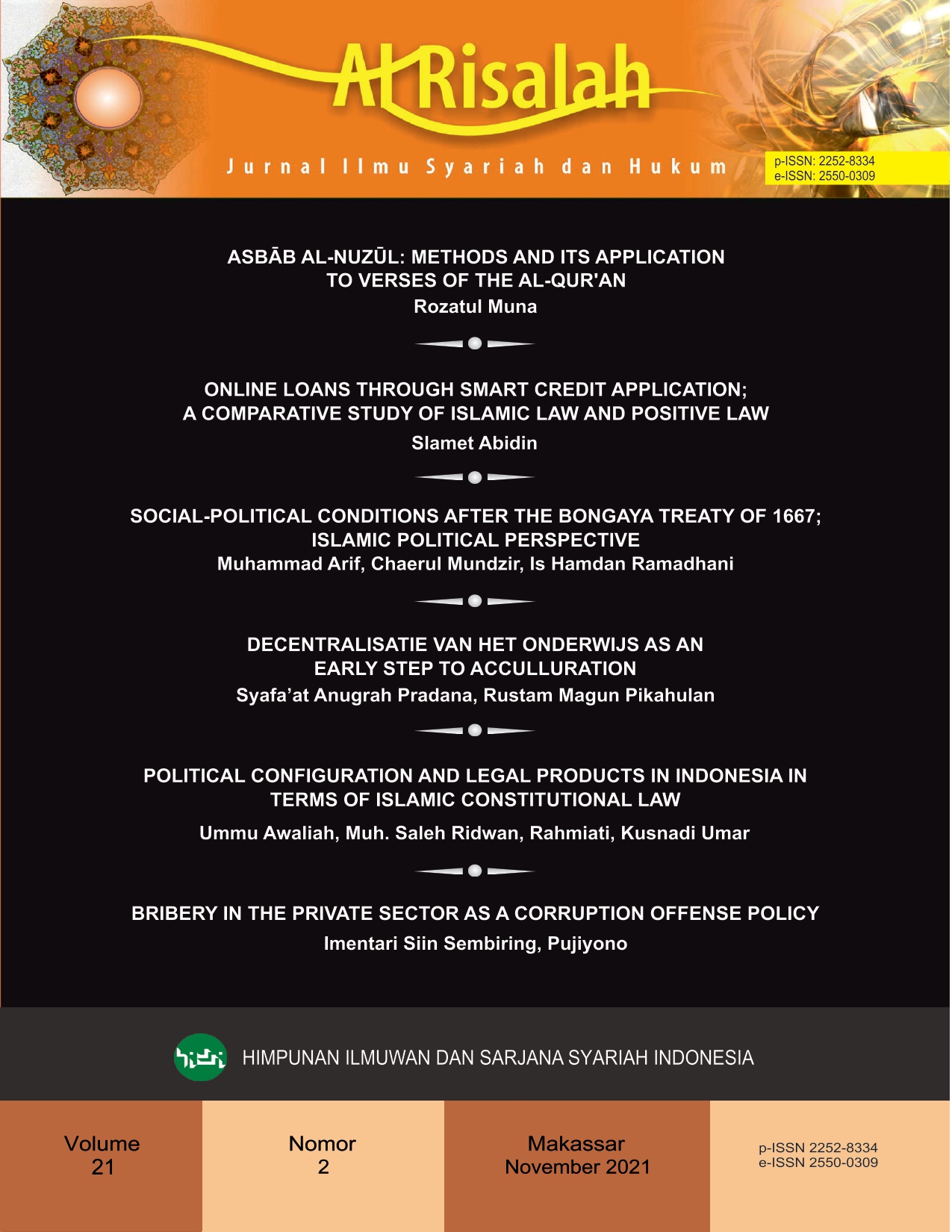SOCIAL-POLITICAL CONDITIONS AFTER THE BONGAYA TREATY OF 1667; ISLAMIC POLITICAL PERSPECTIVE
Abstract
This article aimed to describe the socio-political conditions after the Bongaya Treaty of 1667. This study employed the historical research method (library research). The researcher applied several approaches, namely the historical approach, religious approach, anthropological approach, and sociological approach. The Makassar War is a momentum for change from all aspects, not only changes from the political aspect but also the social, cultural and economic aspects that greatly tormented the people of Gowa. As a King, Sultan Hasanudin was responsible for the fate of the royal people of Gowa, which was getting sad. Sultan Hasanudin had to consider this even though he wanted to continue to fight. Sultan Hasanudin really understood the suffering of the people of the Kingdom of Gowa. Due to these considerations, the war lasted approximately four years, starting from 1666-1669 and ending with the Bungaya Treaty, which consisted of 30 articles. The treaty affected all aspects of Gowa community life, not only in terms of political factors but also the existence of Muslims. Since then, the power and influence of the Netherlands in East Indonesia began to be embedded towards serious colonialism. Sultan Hasanuddin, who dashed to defend his country until the last second has controlled the Kingdom of Gowa for 16 years; namely 1653-1669 and died in Gowa on June 12, 1670.
References
DAFTAR PUSTAKA
Andaya, Leonard Y. The Heritage of Arung Palakka: A History of South Sulawesi (Celebes) in the Seventeenth Century, terj. Nurhady Simorok, Warisan Arung Palakka: Sejarah Sulawesi Selatan Abad ke-17.
Bahri, “Perebutan Panggadereng di Kerajaan LOkal di Jazirah Sulawesi Selatan Abad XV-XVII” Pendidikan Sejarah Fakultas Ilmu Sosial, UNM Vol 12, no 1, September 2016.
Haif, Abu, Ritual Dalam Tradisi Mappanre Tasi Nelayan Bugis di Pagatan Kabupaten Tanah Bumbu Kalimantan Selatan: Akulturasi Islam dan Budaya Lokal, “Disertasi”, (Makassar: UIN Alauddin Makassar, 2018).
Mattulada, Sejarah, Masyarakat dan Kebudayaan Sulawesi Selatan, (Cet. I, Ujung Pandang: Hasanuddin University Press, 1998).
Nasution, Harun, Teologi Islam; Aliran Sejarah Analisa Perbandingan, (Jakarta: Universitas Indonesia Press, 2013).
Notosusanto, Nugroho, Mengerti Sejarah (Jakarta: Penerbit Universitas Indonesia,1986).
Paeni, Muchlis “Membedah Perjanjian Bongaya” (Makalah yang disajikan pada Seminar Membedah Perjanjian Bongaya 1667 oleh Kementerian Koordinator Bidang Maritim dan Sumberdaya Republik Indonesia, Makassar, 21 Desember 2015).
Razak, Abd. Daeng Patunru, Sejarah Gowa, (Ujung Pandang : Yayasan Kebudayaan Sul-Sel di Makassar, 1983).
RI, Departemen Agama, Al-quran dan Terjemahan. Cet. I; Bandung: Syaamil Quran, 2011.
Sagimun. Sultan Hasanuddin Menentang VOC. Departemen Pendidikan dan Kebudayaan, Jakarta 1985.
Sagimun. Sultan Hasanuddin Menentang VOC. Departemen Pendidikan dan Kebudayaan, Jakarta 1985.
Sutrisni, Kutoyo, Sultan Hasanuddin. Mutiara Sumber Widya. Jakarta, 2010.
Yusuf, A. Muri”Metode Penelitian Kuantitatif,Kualitatif, dan Penelitian Gabungan”,(Jakarta:Prenadamedia Group,2014).
Copyright (c) Al-Risalah Jurnal Ilmu Syariah dan Hukum

This work is licensed under a Creative Commons Attribution-NonCommercial 4.0 International License.


